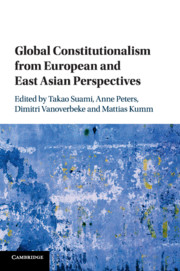Book contents
- Global Constitutionalism from European and East Asian Perspectives
- Global Constitutionalism from European and East Asian Perspectives
- Copyright page
- Contents
- Contributors
- Acknowledgments
- Global Constitutionalism from European and East Asian Perspectives
- Part I Groundwork
- 1 Perpetuum Mobile
- 2 China’s Socialist Rule of Law and Global Constitutionalism
- 3 Global Constitutionalism and East Asian Perspectives in the Context of Political Economy
- 4 Global Constitutionalism and European Legal Experiences
- 5 On the History and Theory of Global Constitutionalism
- Part II Pursuit of Common Values
- Part III Horizontal Interactions
- Part IV Implementation and Enforcement
- Part V Conclusion: East Asia and Global Constitutionalism
- Index
2 - China’s Socialist Rule of Law and Global Constitutionalism
from Part I - Groundwork
Published online by Cambridge University Press: 09 November 2018
- Global Constitutionalism from European and East Asian Perspectives
- Global Constitutionalism from European and East Asian Perspectives
- Copyright page
- Contents
- Contributors
- Acknowledgments
- Global Constitutionalism from European and East Asian Perspectives
- Part I Groundwork
- 1 Perpetuum Mobile
- 2 China’s Socialist Rule of Law and Global Constitutionalism
- 3 Global Constitutionalism and East Asian Perspectives in the Context of Political Economy
- 4 Global Constitutionalism and European Legal Experiences
- 5 On the History and Theory of Global Constitutionalism
- Part II Pursuit of Common Values
- Part III Horizontal Interactions
- Part IV Implementation and Enforcement
- Part V Conclusion: East Asia and Global Constitutionalism
- Index
Summary
- Type
- Chapter
- Information
- Publisher: Cambridge University PressPrint publication year: 2018
- 2
- Cited by



